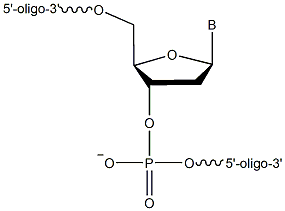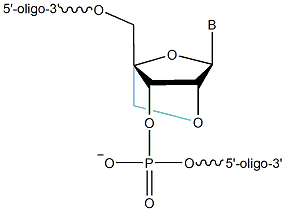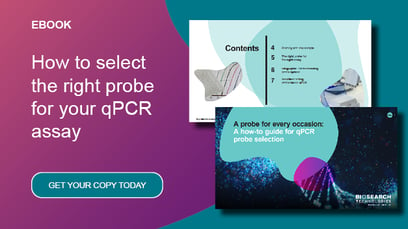Originally published : Mon, July 25, 2022 @ 11:37 AM
Updated : Tue, May 9, 2023 @ 10:40 AM
Let the application be your guide when deciding between LNA, MGB and BHQplus
The many different chemistries available for qPCR probes give scientists a wealth of options during assay development. Locked nucleic acids (LNAs), minor groove binders (MGBs) and BHQplus™ probes all enhance duplex stability, which can help give your assay a high signal-to-noise ratio while keeping the oligo-length fairly compact. They are also better able to accommodate challenging targets like A-T rich sequences. But the unique chemistry of each probe type means that you’ll get the best assay performance – signal-to-noise ratio, limit of detection (LOD), etc. – when you match the probe type to the application.
MGB probes work well for detecting SNPs and difficult gene expression targets
What is an MGB probe?
MGB probes are typically 8-30 bases in length, with a fluorophore on the 5′ end and a quencher on the 3′ end. The 3′ end is also attached to a chemical moiety – the MGB – that non-covalently binds to the minor groove of double stranded DNA.
How do MGB probes work?With an MGB probe, the binding of the MGB to the minor groove of the probe-target structure enhances the stability of the duplex. |
|

Figure 1. MGB probes are dual-labelled 5′ hydrolysis probes consisting of a 5′ fluorescent reporter dye and a 3′ Eclipse Dark Quencher (EDQ), conjugated to an MGB moiety. |
What applications are MGB probes best for? When should you use an MGB probe?
Because the MGB is attached to the end of the oligo, it is easy to design – simply use the oligo sequence complementary to your target region. This makes MGB probes ideal for detecting SNPs and difficult gene expression targets such as sequences rich in A-T content.
However, while the design may be simple, the melting temperature (Tm) cannot be fine tuned.
LGC Biosearch Technologies now offers MGB probes
LNA probes are a great choice for applications requiring high specificity and sensitivity
What is an LNA?
LNAs, also known as bridged nucleic acids, are modified bases where the 2′ oxygen and 4′ carbon of the sugar are covalently joined with a methylene bridge.
|
A
B
Figure 2. A diagram of A) an unmodified nucleotide and B) a locked nucleic acid modification. |
|
How do probes containing LNAs work?When one or more LNAs are used in place of an unmodified monomer, the stability of the probe-target duplex is enhanced. The amount of duplex stabilisation depends on a number of factors, including how many LNAs are used and the position of the LNA(s) within the probe. Because of this, you can fine tune the design of your LNA probe to achieve your desired levels of specificity and stability.
What applications are LNA probes best for? When should you use an LNA probe?While slightly more complicated to design than an MGB probe and requiring iterations of testing to fine-tune performance and Tm, LNA probes can deliver better specificity and discrimination against non-target sequences. They are ideal for applications where high specificity is needed.
|
Interested in LNA-enhanced primers for SYBR Green Assays? In addition to offering LNA probes, Biosearch Technologies also synthesises custom oligos with internal LNA modifications.
Planning an LNA probe design project?
BHQplus probes are an alternative option for applications requiring high specificity and sensitivity
What is a BHQplus probe?
Like LNA probes, BHQplus probes take advantage of chemically modified monomers to enhance the stability and specificity of the probe-target duplex.
However, the proprietary chemistry used in BHQplus probes is different from LNAs, giving scientists another option for probe chemistry.
|
How do BHQplus probes work?The chemical modifications on individual BHQplus monomers stabilises the probe-target duplex. This lets you design shorter probes that have enhanced sensitivity and specificity compared to a probe made with unmodified monomers. |
|
Figure 3. BHQplus probes use modified nucleotides to enhance stability. They are designed to be shorter (15-25 bases) to enhance specificity and improve mismatch discrimination. |
What applications are BHQplus probes best for? When should you use a BHQplus probe?
Like LNA probes, BHQplus probes are great for applications that require high sensitivity and specificity. They offer an easier-to-design and more competitively priced alternative to LNA probe technology and are a good choice for when you don’t need to fine tune the probe performance.
Designing BHQplus probes?
Choosing between great options for probe chemistry
While we’ve highlighted specific benefits that allow each probe chemistry to shine, there is a lot of overlap and you may wish to pilot each type of probe during assay development.
Still unsure which probe is right for your assay? Try our decision tool.
A trusted oligo supplier
Whichever probe format you choose, Biosearch Technologies can meet your exact needs, offering more custom modifications than any other oligo supplier, all with competitive pricing.
We have multi-site oligo manufacturing operations and unique vertical integration, meaning our chemical manufacturing labs produce most of the critical raw materials used in our own oligo synthesis. This ensures a steady and secure, high-quality supply chain.
Ready to learn more about the probe and primer technologies available from Biosearch Technologies?






